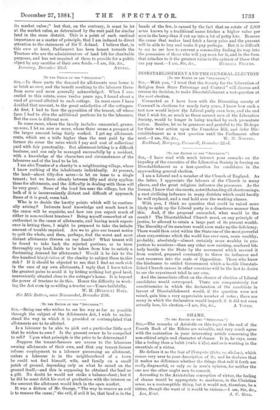:1'0 THE EDITOR OF THE " SPECTATOR."1
Sta,—In these parts the demand for allotments near home is as brisk as ever, and the benefit resulting to the labourer there- from more and more generally acknowledged. When I suc- ceeded to this estate, some twelve years ago, I found about a rood of ground allotted to each cottage. In most cases I have doubled that amount, to the great satisfaction of the cottagers. At first, I had to face the opposition of the tenant, off whose farm I had to slice the additional portions let to the labourers. But the case is different now.
In some cases, where the family includes unmarried, grown-
up sons, I let an acre or more, where there seems a prospect of the larger amount being fairly worked. I get my allotment- rents, which are a trifle higher than the rent paid by the farmer (to cover the rates which I pay and cost of collection) paid with fair punctuality. But allotment-letting is a difficult business, and can only be managed successfully by a resident, with a knowledge of the characters and circumstances of the labourers and of the land to be let.
I am also Trustee of a charity in a neighbouring village, where
I know nothing of the inhabitants individually. At present, the land—about fifty-five acres—is let on lease to a single tenant ; but we have already between fifty and sixty applica- tions for allotments, and the difficulty in dealing with them will be very great. Some of the land lies near the village, but the bulk of it is inconveniently distant and difficult of approach. Some of it is good, some bad.
Who is to decide the knotty points which will be continu-
ally arising ? Intimate local knowledge and much heart in the cause will be requisite, and how can you expect much of either in non-resident trustees ? Being myself somewhat of an enthusiast in the cause of allotments, and having much experi- ence in letting them, I might be prepared to take the infinite amount of trouble required. Are we to give our tenant notice to quit the whole, and then, perhaps, find the worst and most distant allotments thrown on our hands ? What tenant will be found to take back the rejected portions, or to farm thoroughly any land, liable to be taken from him to satisfy a fluctuating demand for allotments ? Would it be fair to the five hundred balyieiaires of the charity to subject them to.this risk ? If it should be objected to me, that I find no such risk in the case of my own allotments, I reply that I have taken the greatest pains to avoid it by letting nothing but good land, conveniently situated close to the cottager's home. It is beyond the power of trustees to do this. Hence the difficulty in work- ing the Act even by so willing a trustee as—Yours faithfully,
W. H. (BuLLocK) HALL.
Six Mile Bottom, near Newmarket, December 25th.


































 Previous page
Previous page